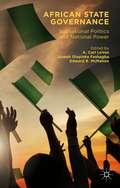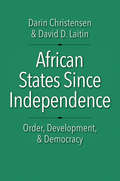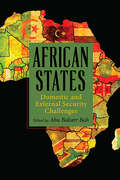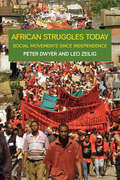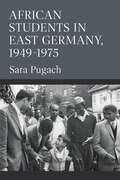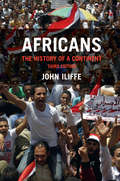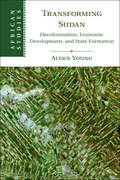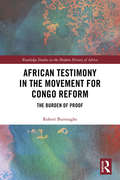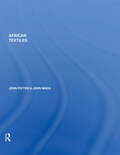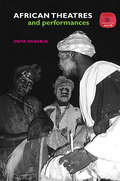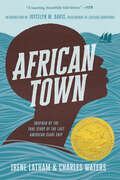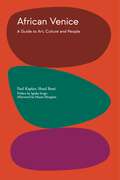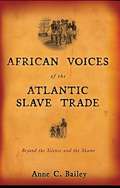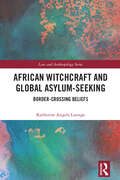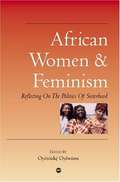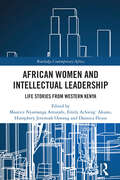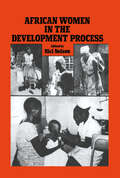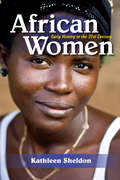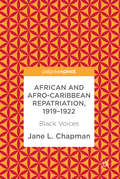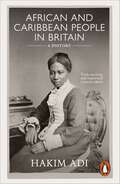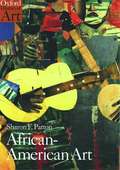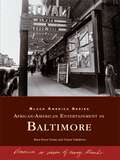- Table View
- List View
African State Governance: Subnational Politics And National Power
by A. Carl LeVan Joseph Olayinka Fashagba Edward R. McMahonAfrica is changing and it is easy to overlook how decentralization, democratization, and new forms of illiberalism have transformed federalism, political parties, and local politics. Chapters on Kenya, Nigeria, Ethiopia, and South Africa help fill an important gap in comparative institutional research about state and local politics in Africa.
African States since Independence: Order, Development, and Democracy (Castle Lecture Series)
by Darin Christensen David D. LaitinAuthors Christensen and Laitin argue that an interplay of geographic, historical, and demographic factors undergird sub‑Saharan states’ post‑independence struggles to eradicate poverty, establish democratic accountability, and quell civil unrest. They set out the founding fathers’ challenges in transforming their postcolonial states, many of which are ethnically diverse, geographically diffuse, sparsely populated, and lacking in administrative capacity. With the legacies of the slave trade, partition, Christian missionaries, and extractive colonial institutions complicating their efforts, many African states faced stagnation, authoritarianism, and civil strife. Recent years have seen promising attempts to restore democracy to states under authoritarian rule and to liberalize their economies, suggesting that the region is moving toward a new era. Relying on the best statistical data and richly illustrated with case material, this book is an indispensable source for scholars and policy analysts seeking to understand Africa’s post‑independence political trajectories.
African States: Domestic and External Security Challenges (SUNY series, James N. Rosenau series in Global Politics)
by Abu Bakarr BahEssays on the security challenges faced by African states.The central concern that shapes this edited volume is the nature of the African state. Contributors point to an interesting intersection of domestic and external issues that is framed as a glocalized security situation. Individual chapters shed new insights on conflict drivers through case studies on Sierra Leone, Cameroon, Mali, Nigeria, and Somalia, as well as broader issues on the nature of African states. Arguments pivot on three issues, which show the intersection of the domestic and external forces that render the African state as a glocal problem: (a) the colonial roots of the state, (b) problems of governance, and (c) international and regional security imperatives. By problematizing the African state and connecting the security challenges of African states to colonialism, patrimonial rule, and geopolitical security issues, African States brings forth a new way of examining African states through the notion of glocalized security.
African Struggles Today
by Peter Dwyer Leo ZeiligThree leading Africa scholars investigate the social forces driving the democratic transformation of postcolonial states across southern Africa. Extensive research and interviews with civil society organizers in Zimbabwe, South Africa, Zambia, Malawi, Namibia, and Swaziland inform this analysis of the challenges faced by non-governmental organizations in relating both to the attendant inequality of globalization and to grassroots struggles for social justice.Peter Dwyer is a tutor in economics at Ruskin College in Oxford.Leo Zeilig Lecturer at the Institute of Commonwealth Studies, University of London.
African Students in East Germany, 1949-1975 (Social History, Popular Culture, And Politics In Germany)
by Sara PugachThis book explores the largely unexamined history of Africans who lived, studied, and worked in the German Democratic Republic. African students started coming to the East in 1951 as invited guests who were offered scholarships by the East German government to prepare them for primarily technical and scientific careers once they returned home to their own countries. Drawn from previously unexplored archives in Germany, Ghana, Kenya, Zambia, and the United Kingdom, African Students in East Germany, 1949–1975 uncovers individual stories and reconstructs the pathways that African students took in their journeys to the GDR and what happened once they got there. The book places these experiences within the larger context of German history, questioning how ideas of African racial difference that developed from the eighteenth through the early twentieth centuries impacted East German attitudes toward the students. The book additionally situates African experiences in the overlapping contexts of the Cold War and decolonization. During this time, nations across the Western and Soviet blocs were inviting Africans to attend universities and vocational schools as part of a drive to offer development aid to newly independent countries and encourage them to side with either the United States or Soviet Union in the Cold War. African leaders recognized their significance to both Soviet and American blocs, and played on the desire of each to bring newly independent nations into their folds. Students also recognized their importance to Cold War competition, and used it to make demands of the East German state. The book is thus located at the juncture of many different histories, including those of modern Germany, modern Africa, the Global Cold War, and decolonization.
African Studies Series: The History of a Continent (African Studies #137)
by John IliffeIn a vast and all-embracing study of Africa, from the origins of mankind to the AIDS epidemic, John Iliffe refocuses its history on the peopling of an environmentally hostile continent. Africans have been pioneers struggling against disease and nature, and their social, economic and political institutions have been designed to ensure their survival. In the context of medical progress and other twentieth-century innovations, however, the same institutions have bred the most rapid population growth the world has ever seen. Africans: The History of a Continent is thus a single story binding living Africans to their earliest human ancestors.
African Studies: Decolonization, Economic Development, and State Formation (African Studies #140)
by Alden YoungFollowing the conclusion of the Second World War, the nature of inequality in Africa was dramatically altered. In this book, Alden Young traces the emergence of economic developmentalism as the ideology of the Sudanese state in the decolonization era. Young demonstrates how the state was transformed, as a result of the international circulation of tools of economic management and the practice of economic diplomacy, from the management of a collection of distinct populations, to the management of a national economy based on individual equality. By studying the hope and eventual disillusionment this ideology gave to late colonial officials and then Sudanese politicians and policymakers, Young demonstrates its rise, and also its shortfalls as a political project in Sudan, particularly its inability to deal with questions of regional and racial equity, not only showing how it fostered state formation, but also civil war.
African Studies: Political Identity and Conflict in Central Angola, 1975–2002
by Justin PearceThis book examines the internal politics of the war that divided Angola for more than a quarter-century after its independence. It emphasises the Angolan people's relationship to the rival political forces that prevented the development of a united nation, an aspect of the conflict that has received little attention in earlier studies. Drawing upon interviews with farmers, town dwellers, soldiers and politicians in Central Angola, Justin Pearce examines the ideologies about nation and state that elites deployed in pursuit of hegemony and traces how people responded to these attempts at politicisation. The book not only demonstrates the potency of the rival conceptions of state and nation in shaping perceptions of self-interest and determining political loyalty, but also shows the ways in which allegiances could and did change for much of the Angolan population in response to the experience of military force.
African Testimony in the Movement for Congo Reform: The Burden of Proof (Routledge Studies in the Modern History of Africa)
by Robert BurroughsThe humanitarian movement against Leopold’s violent colonisation of the Congo emerged out of Europe, but it depended at every turn on African input. Individuals and groups from throughout the upper Congo River basin undertook journeys of daring and self-sacrifice to provide evidence of atrocities for the colonial authorities, missionaries, and international investigators. Combining archive research with attention to recent debates on the relation between imperialism and humanitarianism, on trauma, witnessing and postcolonial studies, and on the recovery of colonial archives, this book examines the conditions in which colonised peoples were able to speak about their subjection, and those in which attempts at testimony were thwarted. Robert Burroughs makes a major intervention by identifying African agency and input as a key factor in the Congo atrocities debate. This is an important and unique book in African history, imperial and colonial history, and humanitarian history.
African Textiles
by J. PictonAn illustrated survey of African textiles - their design, manufacture, and use - as part of African life, art, and culture.
African Theatres and Performances
by Osita OkagbueAfrican Theatres & Performances looks at four specific performance forms in Africa and uses this to question the tendency to employ western frames of reference to analyze and appreciate theatrical performance. The book examines: masquerade theatre in Eastern Nigeria the trance and possession ritual theatre of the Hausa of Northern Nigeria the musical and oral tradition of the Mandinka of Senegal comedy and satire of the Bamana in Mali. Osita Okagbue describes each performance in detail and discusses how each is made, who it is made by and for, and considers the relationship between maker and viewer and the social functions of performance and theatre in African societies. The discussions are based on first-hand observation and interviews with performers and spectators. African Theatres & Performances gives a fascinating account of these practices, carefully tracing the ways in which performances and theatres are unique and expressive of their cultural context.
African Town
by Irene Latham Charles WatersChronicling the story of the last Africans brought illegally to America in 1860, African Town is a powerful and stunning novel-in-verse.In 1860, long after the United States outlawed the importation of enslaved laborers, 110 men, women and children from Benin and Nigeria were captured and brought to Mobile, Alabama aboard a ship called Clotilda. Their journey includes the savage Middle Passage and being hidden in the swamplands along the Alabama River before being secretly parceled out to various plantations, where they made desperate attempts to maintain both their culture and also fit into the place of captivity to which they'd been delivered. At the end of the Civil War, the survivors created a community for themselves they called African Town, which still exists to this day. Told in 14 distinct voices, including that of the ship that brought them to the American shores and the founder of African Town, this powerfully affecting historical novel-in-verse recreates a pivotal moment in US and world history, the impacts of which we still feel today.
African Venice: A Guide to Art, Culture and People
by Shaul Bassi Paul KaplanAfrican Venice is the first guidebook to the extensive historical and contemporary African presence in the city of the lagoons. A set of ten walking tours highlights images of Black people in Venetian art from the Middle Ages to the present, the afterlife of Shakespeare’s Othello, the painful local legacies of slavery and Italian colonialism, and the remarkable visibility of African and Afro-descendant artists at the Venice Biennale. These tours are enriched by more than twenty essays, poems, and reflections that celebrate, question, and reimagine Venice’s Black past and present. From premodern paintings and sculpture to contemporary artworks, African Venice will show you the city as you have never seen it.The book includes contributions from Marilena Umuhoza Delli, Rita Dove, Emiliano Guaraldo, Eddy L. Harris, Lorenzo Lazzarini, Ibrahima Lö, Vittorio Longhi, Olga Manente, Tony Mochama, Yvonne Adhiambo Owuor, Caryl Phillips, Sandra Stocchetto, Sami Tchak, Ngūgī wa Thiong’o, and Alessandra Viola.
African Voices of the Atlantic Slave Trade: Beyond the Silence and the Shame
by Anne BaileyIt's an awful story. It's an awful story. Why do you want to bring this up now?--Chief Awusa of AtorkorFor centuries, the story of the Atlantic slave trade has been filtered through the eyes and records of white Europeans. In this watershed book, historian Anne C. Bailey focuses on memories of the trade from the African perspective. African chiefs and other elders in an area of southeastern Ghana-once famously called "the Old Slave Coast"-share stories that reveal that Africans were traders as well as victims of the trade. Bailey argues that, like victims of trauma, many African societies now experience a fragmented view of their past that partially explains the blanket of silence and shame around the slave trade. Capturing scores of oral histories that were handed down through generations, Bailey finds that, although Africans were not equal partners with Europeans, even their partial involvement in the slave trade had devastating consequences on their history and identity. In this unprecedented and revelatory book, Bailey explores the delicate and fragmented nature of historical memory.From the Trade Paperback edition.
African Voices on Slavery and the Slave Trade
by Alice Bellagamba Sandra E. Greene Martin A. Klein Alice Bellagamba Sandra E. GreeneThough the history of slavery is a central topic for African, Atlantic world and world history, most of the sources presenting research in this area are European in origin. To cast light on African perspectives, and on the point of view of enslaved men and women, this group of top Africanist scholars has examined both conventional historical sources (such as European travel accounts, colonial documents, court cases, and missionary records) and less-explored sources of information (such as folklore, oral traditions, songs and proverbs, life histories collected by missionaries and colonial officials, correspondence in Arabic, and consular and admiralty interviews with runaway slaves). Each source has a short introduction highlighting its significance and orienting the reader. This first of two volumes provides students and scholars with a trove of African sources for studying African slavery and slave trade.
African Voices on Slavery and the Slave Trade
by Martin A. Klein Alice Bellagamba Sandra E. Greene Bellagamba, Alice and Greene, Sandra E. and Klein, Martin A.Though the history of slavery is a central topic for African, Atlantic world and world history, most of the sources presenting research in this area are European in origin. To cast light on African perspectives, and on the point of view of enslaved men and women, this group of top Africanist scholars has examined both conventional historical sources (such as European travel accounts, colonial documents, court cases, and missionary records) and less-explored sources of information (such as folklore, oral traditions, songs and proverbs, life histories collected by missionaries and colonial officials, correspondence in Arabic, and consular and admiralty interviews with runaway slaves). Each source has a short introduction highlighting its significance and orienting the reader. This first of two volumes provides students and scholars with a trove of African sources for studying African slavery and slave trade.
African Witchcraft and Global Asylum-Seeking: Border-Crossing Beliefs (Law and Anthropology)
by Katherine LuongoThis book analyzes how over the last two decades, immigration regimes in three primary refugee-receiving states in the Global North – Canada, Australia, and the United Kingdom – have engaged with allegations about witchcraft-driven violence made by asylum seekers coming from Anglophone countries across the African continent. The work intervenes at the nexus of anthropological, historical, legal, developmental, and human rights literatures to offer fresh insights into extrajudicial violence and global migration. Taking witchcraft-based asylum cases as its focal point, it argues that the recent dramatic expansion in claims to refugee protection under the ‘particular social group’ category of the 1951 UN Refugee Convention reflects immigration authorities’ increasing willingness to consider how legally recognizable persecution can derive from cultural practices and beliefs. Reflecting critically on such cases, it advances understandings of how witchcraft beliefs and practices have persisted as significant engines of violence in the contemporary world. It sheds light both on the limits of legal pluralism and cultural relativism in asylum adjudication and on how social scientific expertise contributes not simply to the flow of ideas, but also to the channelling of people across national, cultural, and epistemological boundaries. The book will be essential reading for students and researchers in legal anthropology, African studies, human rights, transnational history, migration and refugee law and policy, and the history and anthropology of witchcraft.
African Women and Feminism: Reflecting on the Politics of Sisterhood
by Oyeronke OyewumiThe relationship between African women and feminism is a contentious one. Embedded in this connection is the question of whether sisterhood - a mantra assuming a common oppression of all women and signifying feminist international/cross-cultural relations - describes the symbolic and functional representation of African women. The contributors in this book are aware of the global discourse on women as articulated by Western feminists and interrogate the issues raised by the misinterpretation of African women of both black and white American feminists. The implications of the dominance of Western men and women in the production of knowledge about Africa are also explored. <p><p> This is one of the first collections written by African women who were born and raised in Africa and are now teaching in the United States. The papers here focus on a variety of issues including the uses and abuses of female circumcision in global feminist discourse, the problem of the criminalization approach to eradicating female circumcision, the effect of the image of the victimized African woman on development policy, and gender imperialism as a metascript of domination and oppression and as encountered by African women in the academy.
African Women and Intellectual Leadership: Life Stories from Western Kenya (ISSN)
by Emily Achieng’ Akuno Maurice Nyamanga Amutabi Humphrey Jeremiah Ojwang Dannica FleussThis book highlights the pioneering roles of African women as leaders and role models in Kenya, providing examples taken from across education, health, business, and a range of other sectors. Drawing on authentic first-hand accounts and narratives from key women in leadership positions, and those who have lived with them, the book presents the life stories of women leaders over the last fifty years, aiming to preserve their contributions for posterity and to inspire young people with moral, ethical, and progressive role models. The book uses African knowledge production strategies that look at the human being holistically, in the prism of Ubuntu, in order to define leadership in Africa from an African perspective, one that celebrates the role of the mother figure and places women at the centre of African values and societal dynamics. This book will be of interest to researchers and students of African studies, gender studies, and Kenyan education and socio-political history.
African Women in the Development Process
by Nici NelsonFirst published in 1981. The World Conference in Mexico City in 1975 marked the beginning of a global examination of women's roles in the economic, political and social life of their societies and a recognition of their right to participate fully and equally in all aspects of society. Most of the articles in this volume confirm, a great deal more needs to be done. Women continue to be more underfed, under educated and overworked than men ... a neglected and under-utilized minority. All of the articles in this Special Issue concentrate on sub-Saharan Africa, with the exception of Beneria's paper 'Accounting for Women's Work' which is a genera theoretical article. Most of the articles (five out of eight) in this issue deal with specific situations in which African women find themselves, ranging widely from sub-elite nurses in Zambia to the efforts of uneducated women in Nigeria to form a cooperative. Two of these articles concern the effect of development projects on women.
African Women: Early History to the 21st Century
by Kathleen SheldonAfrican women's history is a topic as vast as the continent itself, embracing an array of societies in over fifty countries with different geographies, social customs, religions, and historical situations. In African Women: Early History to the 21st Century, Kathleen Sheldon masterfully delivers a comprehensive study of this expansive story from before the time of records to the present day. She provides rich background on descent systems and the roles of women in matrilineal and patrilineal systems. Sheldon’s work profiles elite women, as well as those in leadership roles, traders and market women, religious women, slave women, women in resistance movements, and women in politics and development. The rich case studies and biographies in this thorough survey establish a grand narrative about women’s roles in the history of Africa.
African and Afro-Caribbean Repatriation, 1919–1922: Black Voices
by Jane L. ChapmanThis book is the first attempt to analyse records of people of Afro-Caribbean origin who appealed against repatriation during the painful period after Britain’s 1919 race riots. Revealing personal letters and petitions from the West Indies, West Africa, and the UK, Jane Chapman demonstrates that conflict adjustment involving individual voices needs to be highlighted. She asks, what was the human environment, the dilemmas and the racist compulsions making transnational experiences in the British Empire so poignant? Analysing both the opinions of civil servants on appellants’ statements of hardship and requests for financial help, and the voices of the appellants themselves, this book aims to rediscover black people’s hidden heritage.
African and Caribbean People in Britain: A History
by Hakim AdiSHORTLISTED FOR THE WOLFSON HISTORY PRIZE A major new history of Britain that transforms our understanding of this country's past'I've waited so long so read a comprehensively researched book about Black history on this island. This is it: a journey of discovery and a truly exciting and important work' Zainab Abbas Despite the best efforts of researchers and campaigners, there remains today a steadfast tendency to reduce the history of African and Caribbean people in Britain to a simple story: it is one that begins in 1948 with the arrival of a single ship, the Empire Windrush, and continues mostly apart from a distinct British history, overlapping only on occasion amid grotesque injustice or pioneering protest.Yet, as acclaimed historian Hakim Adi demonstrates, from the very beginning, from the moment humans first stood on this rainy isle, there have been African and Caribbean men and women set at Britain's heart. Libyan legionaries patrolled Hadrian's Wall while Rome's first 'African Emperor' died in York. In Elizabethan England, 'Black Tudors' served in the land's most eminent households while intrepid African explorers helped Sir Francis Drake to circumnavigate the globe. And, as Britain became a major colonial and commercial power, it was African and Caribbean people who led the radical struggle for freedom - a struggle which raged throughout the twentieth century and continues today in Black Lives Matter campaigns.Charting a course through British history with an unobscured view of the actions of African and Caribbean people, Adi reveals how much our greatest collective achievements - universal suffrage, our victory over fascism, the forging of the NHS - owe to these men and women, and how, in understanding our history in these terms, we are more able to fully understand our present moment.
African-American Art
by Sharon F. PattonFrom its origins in early 18th century slave communities to the end of the 20th century, African-American art has made a vital contribution to the art of the United States. This book provides a major reassessment of the subject, setting the art in the context of the African-American experience.
African-American Entertainment in Baltimore (Black America Series)
by Tonya Taliaferro Rosa Pryor-TrustyAfrican-American Entertainment in Baltimore captures the brilliance of the city's musical heritage from 1930 to 1980. This educational and entertaining volume invites readers to take a visual trip down memory lane to the days when Pennsylvania Avenue, the heart of the city's African-American community, vibrated with life. Celebrated within these pages are entertainers such as The Ink Spots, Sonny Til & the Orioles, Illinois Jacquet, Cab Calloway, Lionel Hampton, Sammy Davis Jr., Slappy White, Pearl Bailey, Billie Holiday, and Ella Fitzgerald; The Avenue's hottest nightspots and theaters including the legendary Royal Theater, The Regent Theater, the Sphinx, and Club Casino; and the DJs and promoters who helped cultivate the city's musical talents.
